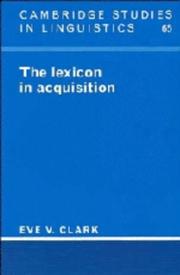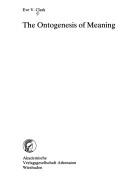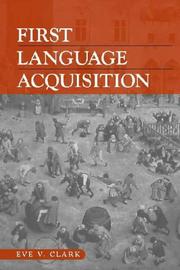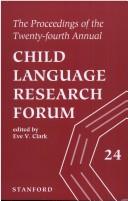| Listing 1 - 10 of 18 | << page >> |
Sort by
|
Book
ISBN: 9781316507605 9781107143005 Year: 2016 Publisher: Cambridge, United Kingdom : Cambridge University Press,
Abstract | Keywords | Export | Availability | Bookmark
 Loading...
Loading...Choose an application
- Reference Manager
- EndNote
- RefWorks (Direct export to RefWorks)
"How do young children learn language? When does this process start? What does language acquisition involve? Children are exposed to language from birth, surrounded by knowledgeable speakers who offer feedback and provide extensive practice every day. Through conversation and joint activities, children master the language being used around them. This fully revised third edition of Eve V. Clark's bestselling textbook offers comprehensive coverage of language acquisition, from a baby's first sounds to a child's increasing skill in negotiating, explaining and entertaining with language. This book, drawing together the most recent findings in the field, and illustrated with examples from a wide range of experimental and observational studies, including the author's own diary observations, presents an essential and comprehensive guide to first language acquisition. It will be fascinating reading for students of linguistics, developmental psychology, and cognitive science"--
Psycholinguistics --- Pragmatics --- LANGUAGE ARTS & DISCIPLINES / Linguistics / General. --- Language acquisition. --- Langage --- Acquisition --- Children --- Enfants --- Language

ISBN: 0521440505 9780521440509 9780511554377 9780521484640 Year: 1993 Volume: 65 Publisher: Cambridge Cambridge University Press
Abstract | Keywords | Export | Availability | Bookmark
 Loading...
Loading...Choose an application
- Reference Manager
- EndNote
- RefWorks (Direct export to RefWorks)
Lexicology. Semantics --- Psycholinguistics --- Acquisition du langage --- Acquisition of language --- Langage [Acquisition du ] --- Language acquisition --- Language development in children --- Lexique --- Stock of words --- Taalverwerving --- Vocabulaire --- Vocabulary --- Woordenschat --- Word books --- Words [Stock of ] --- Langage --- Acquisition --- --Acquisition --- --Vocabulaire --- --Language acquisition --- English language --- Words, Stock of --- Diction --- Lexicology --- Developmental linguistics --- Developmental psycholinguistics --- Language and languages --- Psycholinguistics, Developmental --- Interpersonal communication in children

ISBN: 379970714X Year: 1979 Publisher: Wiesbaden Athenaion
Abstract | Keywords | Export | Availability | Bookmark
 Loading...
Loading...Choose an application
- Reference Manager
- EndNote
- RefWorks (Direct export to RefWorks)
Lexicology. Semantics --- Psycholinguistics --- Language acquisition --- Semantics --- Formal semantics --- Semasiology --- Semiology (Semantics) --- Comparative linguistics --- Information theory --- Language and languages --- Lexicology --- Meaning (Psychology) --- Acquisition of language --- Developmental linguistics --- Developmental psycholinguistics --- Language development in children --- Psycholinguistics, Developmental --- Interpersonal communication in children --- Acquisition --- Language acquisition. --- Semantics.

ISBN: 0521620031 0521629977 9780521629973 Year: 2006 Publisher: Cambridge Cambridge University press
Abstract | Keywords | Export | Availability | Bookmark
 Loading...
Loading...Choose an application
- Reference Manager
- EndNote
- RefWorks (Direct export to RefWorks)
Psycholinguistics --- Pragmatics --- #KVHB:Taalontwikkeling --- Language acquisition --- Acquisition of language --- Developmental linguistics --- Developmental psycholinguistics --- Language and languages --- Language development in children --- Psycholinguistics, Developmental --- Interpersonal communication in children --- Acquisition --- Language acquisition.
Book
ISBN: 9780521514132 9780521732932 052173293X Year: 2010 Publisher: Cambridge : Cambridge university press,
Abstract | Keywords | Export | Availability | Bookmark
 Loading...
Loading...Choose an application
- Reference Manager
- EndNote
- RefWorks (Direct export to RefWorks)
#KVHB:Taalontwikkeling --- Language acquisition. --- Language acquisition --- Acquisition of language --- Developmental linguistics --- Developmental psycholinguistics --- Language and languages --- Language development in children --- Psycholinguistics, Developmental --- Interpersonal communication in children --- Psycholinguistics --- Acquisition --- Pragmatics

ISBN: 0521484642 0521440505 0511995075 0511554370 Year: 1993 Publisher: Cambridge : Cambridge University Press,
Abstract | Keywords | Export | Availability | Bookmark
 Loading...
Loading...Choose an application
- Reference Manager
- EndNote
- RefWorks (Direct export to RefWorks)
Without words, children can't talk about people, places, things, actions, relations, or states, and they have no grammatical rules. Without words, there would be no sound structure, no word structure, and no syntax. The lexicon is central in language, and in language acquisition. Eve Clark argues for this centrality and for the general principles of conventionality and contrast at the core of language acquisition. She looks at the hypotheses children draw on about possible word meanings, and how they map their meanings on to forms. The book is unusual in dealing with data from a wide variety of languages, in its emphasis on the general principles children rely on as they analyse complex word forms, and in the broad perspective it takes on lexical acquisition.
Arts and Humanities --- Language & Linguistics --- Language acquisition. --- Vocabulary. --- Diction --- Lexicology --- Interpersonal communication in children --- Psycholinguistics

ISBN: 1881526046 Year: 1993 Publisher: Stanford (Calif.): CSLI
Abstract | Keywords | Export | Availability | Bookmark
 Loading...
Loading...Choose an application
- Reference Manager
- EndNote
- RefWorks (Direct export to RefWorks)
Ethics --- -Brothers --- -Fathers --- -Fathers and sons --- -Wake services --- -Medicine --- -Drama --- Death --- -Drama --- Drama --- Drama --- Miscellanea
Book
ISBN: 9781009294492 9781009294522 Year: 2024 Publisher: Cambridge, UK : Cambridge University Press,
Abstract | Keywords | Export | Availability | Bookmark
 Loading...
Loading...Choose an application
- Reference Manager
- EndNote
- RefWorks (Direct export to RefWorks)
Book
ISBN: 9789027234773 9027234779 9789027285041 9027285047 1283174790 9786613174796 9781283174794 6613174793 Year: 2011 Publisher: Amsterdam Philadelphia John Benjamins Pub.
Abstract | Keywords | Export | Availability | Bookmark
 Loading...
Loading...Choose an application
- Reference Manager
- EndNote
- RefWorks (Direct export to RefWorks)
Theories of language acquisition must address the role of constraints in children's learning. Are they language-specific or domain-general? Do they come from the learner or are do they result from external factors like the nature of the data? In this chapter we describe how Bayesian modeling may be used to explore this issue. The Bayesian framework has been useful for determining what an ideal learner might be able to learn given a certain set of specific constraints and a certain type of input. It also provides a natural way to compare the effect of different constraints, and to grow towards increasingly cognitively natural models by altering those constraints. Keywords: Learning constraints; Bayesian modeling.
Psycholinguistics --- Language acquisition --- Languages & Literatures --- Philology & Linguistics --- Language acquisition. --- Acquisition of language --- Developmental linguistics --- Developmental psycholinguistics --- Language and languages --- Language development in children --- Psycholinguistics, Developmental --- Acquisition --- Interpersonal communication in children
Book
ISBN: 0155728156 9780155728158 Year: 1977 Publisher: New York, NY : Harcourt Brace Jovanovich,
Abstract | Keywords | Export | Availability | Bookmark
 Loading...
Loading...Choose an application
- Reference Manager
- EndNote
- RefWorks (Direct export to RefWorks)
Psycholinguistics --- Psycholinguistique --- 159.9:800 --- 800:159.9 --- #SBIB:309H517 --- Language, Psychology of --- Language and languages --- Psychology of language --- Speech --- Linguistics --- Psychology --- Thought and thinking --- Psycholinguistiek --- Taalwetenschap. Taalkunde. Linguistiek-:-Psychologie: zie ook: Psychiatrie: n-{616.89-008} en n-{615.851} --- Verbale communicatie: sociale psychologie van de taal en de interactie, psycholinguistiek --- Psychological aspects --- Psycholinguistics. --- 800:159.9 Taalwetenschap. Taalkunde. Linguistiek-:-Psychologie: zie ook: Psychiatrie: n-{616.89-008} en n-{615.851} --- 159.9:800 Psycholinguistiek
| Listing 1 - 10 of 18 | << page >> |
Sort by
|

 Search
Search Feedback
Feedback About UniCat
About UniCat  Help
Help News
News